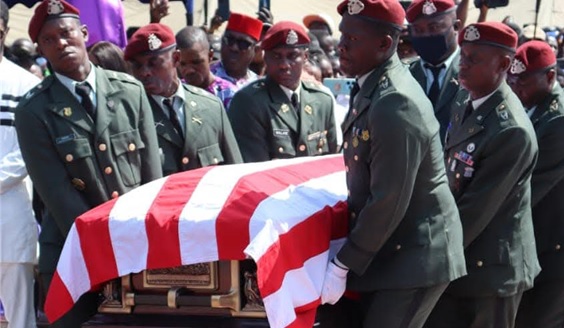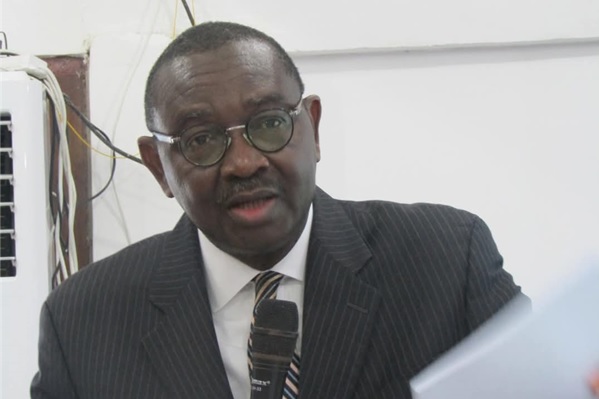NIMBA COUNTY, LIBERIA – The funeral of the late Senator Prince Yormie Johnson, held on January 18, 2025, in Gompa City, Nimba County, was supposed to be a solemn occasion to honor a man who had played an important role in Liberia’s history. Yet, the event turned into a political battlefield, with prominent figures in Liberian politics using the opportunity to advance their own narratives about the country’s troubled past and uncertain future.
Grand Gedeh County Senator Thomas Nimely, a long-time friend of the late Johnson, was among those to speak. His tribute to the deceased senator quickly shifted from a personal reflection to a strong political statement. He described Johnson as a man who had been betrayed by the very political system he had once supported, accusing Liberia’s leadership, particularly President Joseph Boakai, of failing to uphold promises made to Johnson in exchange for his loyalty. According to Nimely, Johnson had stood by successive administrations, including that of Boakai, in the hope that he would be spared prosecution for his involvement in the country’s brutal civil war. However, the establishment of the War and Economic Crimes Court, Nimely argued, was a sharp betrayal of the senator’s trust, effectively opening the door for possible prosecution and public disgrace.
The controversial signing of the executive order that paved the way for the court’s creation became the focal point of Nimely’s speech. His accusations were not just about one individual, but about a system that had failed to protect Johnson in his final years. Nimely contended that the late senator had always advocated for peace and reconciliation in Liberia, working tirelessly to ensure that former combatants like himself could reintegrate into the political process. Yet, when the time came for the promises made to him to be fulfilled, Johnson found himself abandoned. His once staunch political allies turned against him, and the promise of justice became a looming threat.
In the midst of this charged atmosphere, Speaker of the House Richard Nagbeh Koon took to the podium to challenge Nimely’s version of events. Koon’s remarks added fuel to the fire, accusing Nimely of hypocrisy and betrayal. He pointed out that it was Nimely who had signed the resolution that eventually led to the establishment of the War Crimes Court. “You troubled him,” Koon declared, directing his ire at Nimely. “You signed that resolution when you knew the consequences it would have on Prince Johnson. If you were truly his friend, you would have never done that.” Koon’s words were a direct assault on Nimely’s integrity, underscoring the deep rift between the two politicians.
Koon’s accusations painted a stark contrast to Nimely’s claims, suggesting that the decision to pursue war crimes accountability was not only a necessary step but also an inevitable one for Liberia’s future. For Koon, the signing of the War Crimes Court resolution was a matter of principle, essential for the nation’s healing and progress. However, for Nimely, it represented a catastrophic misstep that threatened to unravel the fragile peace that had been painstakingly built over the years.
The tension did not end with Koon’s rebuttal. Representatives of the Movement for Democracy and Reconstruction (MDR), the party formerly led by Senator Johnson, added their voices to the fray. Nesco Wollo, speaking on behalf of the MDR, accused both the Liberian government and the international community of exerting undue pressure on Johnson in his final days. Wollo contended that the establishment of the War Crimes Court was the primary factor that contributed to Johnson’s declining health and eventual death. According to Wollo, Johnson had been driven to the brink by the relentless pressure surrounding the court’s creation. The MDR’s portrayal of Johnson as a man pushed to his limits resonated with many in the crowd, painting him as a victim of a political system that had once embraced him but later turned its back on him when he was most vulnerable.
The remarks from Wollo and others in the MDR were a direct indictment of Liberia’s political elites and the international forces that supported the push for war crimes accountability. They argued that the pressure on Johnson was not just about justice, it was about political retribution. In their view, Johnson had been a pivotal figure in Liberia’s political landscape, yet the government had chosen to prioritize accountability over reconciliation, which, according to the MDR, was a fatal miscalculation.
The ideological clash between those who supported the War Crimes Court and those who saw it as a threat to national unity could not have been clearer. The funeral, which should have been an occasion for unity and reflection, became the venue for an intense political debate over the country’s future. On one side were the proponents of justice, who argued that Liberia could never move forward without confronting its past. On the other were those who believed that prosecuting former warlords and political figures like Johnson would only deepen the divisions within the country and jeopardize the fragile peace that had been established in the years following the civil war.
The political infighting that unfolded at Johnson’s funeral reflected a deeper malaise within Liberia’s political system, a system still grappling with the legacy of civil war and struggling to find a balance between justice and reconciliation. While figures like Nimely and Wollo saw the establishment of the War Crimes Court as a betrayal that would fracture the fragile peace, others like Koon viewed it as a necessary step toward accountability, even if it carried significant political risks.
As the funeral drew to a close, the rift between Liberia’s political factions remained as deep as ever. Johnson’s death had become a symbol of the painful choices the country must make as it seeks to reckon with its past. The debate over the War Crimes Court was far from over, and the divisions within the political establishment seemed likely to persist, shaping the future of the nation for years to come.
In the end, the political spectacle that overshadowed Prince Yormie Johnson’s funeral served as a glaring reminder of Liberia’s ongoing struggles with its past. The war crimes debate, fueled by competing political interests, continues to divide the nation, raising fundamental questions about how Liberia can heal from its violent history while ensuring that justice is served. As Liberia’s political leaders grapple with these questions, the memory of Prince Johnson, a man who was both a symbol of the country’s painful past and a key figure in its present, will remain a point of contention for generations to come.






